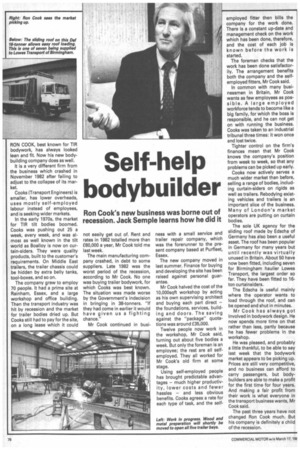Self-help bodybuilder
Page 78

If you've noticed an error in this article please click here to report it so we can fix it.
Ron Cook's new business was borne out of recession. Jack Semple learns how he did it
RON COOK, best known for TIR bodywork, has always looked lean and fit. Now his new bodybuilding company does as well.
It is a very different firm from the business which crashed in November 1982 after failing to adjust to the collapse of its market.
Cooks (Transport Engineers) is smaller, has lower overheads, uses mostly self-employed labour instead of employees, and is seeking wider markets.
In the early 1970s, the market for TIR tilt bodies boomed. Cooks was pushing out 25 a week, every week, and was almost as well known in the tilt world as Boalloy is now on curtain-siders. They were quality products, built to the customer's requirements. On Middle East trailers, the trailer chassis could be hidden by extra belly tanks, tool-boxes, and so on.
The company grew to employ 70 people. It had a prime site at Rainham, Essex, and a large workshop and office building. Then the transport industry was hit by recession and the market for trailer bodies dried up. But Cooks still had to pay for the site, on a long lease which it could not easily get out of. Rent and rates in 1982 totalled more than £60,000 a year, Mr Cook told me last week.
The main manufacturing company crashed, in debt to some suppliers. Late 1982 was the worst period of the recession, according to Mr Cook. No one was buying trailer bodywork, for which Cooks was best known. The situation was made worse by the Government's indecision in bringing in 38-tonners. "If they had come in earlier it would have given us a fighting chance."
Mr Cook continued in busi ness with a small service and trailer repair company, which was the forerunner to the present company based at Purfleet, Essex.
The new company moved in last summer. Finance for buying and developing the site has been raised against personal guarantee.
Mr Cook halved the cost of the 10,000sqft workshop by acting as his own supervising architect and buying each part direct — the foundations, services, building and doors. The saving against the "package" quotations was around £35,000.
Twelve people now work in the workshop, Mr Cook said, turning out about five bodies a week. But only the foreman is an employee; the rest are all selfemployed. They all worked for Mr Cook's old firm at some stage.
Using self-employed people has brought predictable advantages — much higher productivity, lower costs and fewer hassles — and less obvious benefits. Cooks agrees a rate for each type of task, and the self employed fitter then bills the company for the work done. There is a constant up-date and management check on the work which has been done, therefore, and the cost of each job is known before the work is started.
The foreman checks that the work has been done satisfactorily. The arrangement benefits both the company and the selfemployed fitters, Mr Cook said.
In common with many businessmen in Britain, Mr Cook wants as few employees as possible. A large employed workforce tends to become like a big family, for which the boss is responsible, and he can not get on with running the business. Cooks was taken to an industrial tribunal three times: it won once and lost twice.
Tighter control on the firm's finances mean that Mr Cook knows the company's position from week to week, so that any problems can be picked up early.
Cooks now actively serves a much wider market than before, selling a range of bodies, including curtain-siders on rigids as well as trailers. Rebodying existing vehicles and trailers is an important slice of the business. Many of London's market operators are putting on curtain bodies.
The sole UK agency for the sliding roof made by Edscha of Germany has also been a useful asset. The roof has been popular in Germany for many years but until recently was virtually unused in Britain. About 50 have now been fitted, including seven for Birmingham haulier Lowes Transport, the largest order so far. They have been fitted to 16ton curtainsiders.
The Edscha is useful mainly where the operator wants to load through the roof, and can be opened and shut in minutes.
Mr Cook has always got involved in bodywork design. He now spends more time on that rather than less, partly because he has fewer problems in the workshop.
He was pleased, and probably a little thankful, to be able to say last week that the bodywork market appears to be picking up. Prices are still very competitive, and no business can afford to carry passengers, but bodybuilders are able to make a profit for the first time for four years. And making a fair profit from their work is what everyone in the transport business wants, Mr Cook said.
The past three years have not changed Ron Cook much. But his company is definitely a child of the recession.
















































































































